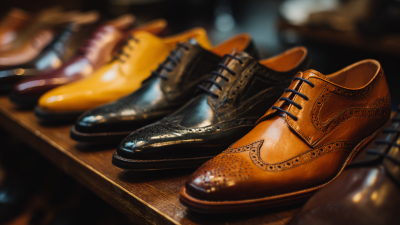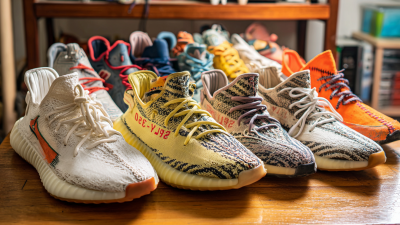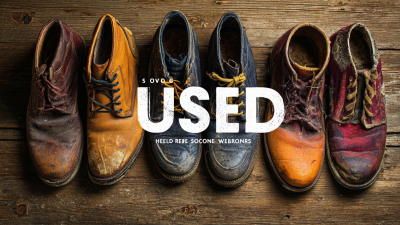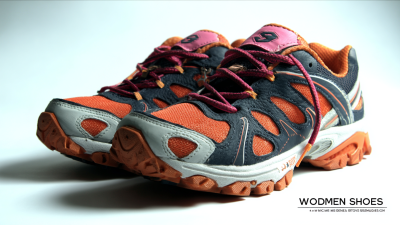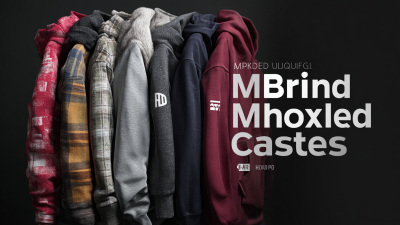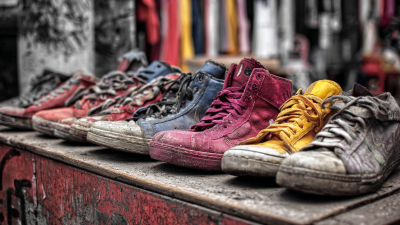Leave Your Message
 In the competitive landscape of retail, finding reliable sources for high-quality merchandise is paramount, especially when it comes to niche markets like Ukay Shoes Bales. According to recent industry reports, the global used footwear market is projected to reach USD 32 billion by 2027, with a significant portion attributed to the growing popularity of second-hand goods among eco-conscious consumers. Ukay Shoes Bales provide an excellent opportunity for retailers to capitalize on this trend, offering a diverse selection of unique and affordable footwear options. By effectively sourcing these bales, retailers can not only enhance their product offerings but also align with sustainable practices that resonate with today's shoppers. Understanding the dynamics of sourcing Ukay Shoes Bales will be key to driving retail business success in this evolving market.
In the competitive landscape of retail, finding reliable sources for high-quality merchandise is paramount, especially when it comes to niche markets like Ukay Shoes Bales. According to recent industry reports, the global used footwear market is projected to reach USD 32 billion by 2027, with a significant portion attributed to the growing popularity of second-hand goods among eco-conscious consumers. Ukay Shoes Bales provide an excellent opportunity for retailers to capitalize on this trend, offering a diverse selection of unique and affordable footwear options. By effectively sourcing these bales, retailers can not only enhance their product offerings but also align with sustainable practices that resonate with today's shoppers. Understanding the dynamics of sourcing Ukay Shoes Bales will be key to driving retail business success in this evolving market.
When sourcing high-quality Ukay shoes bales for your retail business, identifying top-rated suppliers in the UK market is crucial to ensure product quality and profitability. The secondhand clothing market is rapidly evolving, with increased awareness and ethical considerations influencing consumer behavior. Recent studies indicate that the global market for secondhand apparel is expected to reach $64 billion by 2024, driven by a growing demand for sustainable fashion among consumers.
In the UK, the demand for Ukay shoes has surged as retailers look to capitalize on this trend. However, not all suppliers are created equal. Research shows that reputable suppliers often maintain strict quality control standards, ensuring that their bales meet consumer expectations. Engaging with suppliers who have established Good Manufacturing Practices and transparent sourcing methods is essential. Furthermore, it’s important to consider suppliers who are aware of the environmental and social impacts of the secondhand clothing industry, as emphasized by ongoing discussions about the sustainability challenges facing global markets, especially in regions like West Africa where many old clothes are transitioned back into the supply chain. By carefully selecting suppliers who align with these values, retailers can ensure they provide quality products while contributing to a more sustainable and responsible industry.
When sourcing high-quality Ukay shoes bales for your retail business, understanding the key factors that determine quality is essential. One of the primary aspects to consider is the sourcing origin. According to a report by the Global Footwear Market, shoes sourced from established suppliers in regions with strict quality controls generally exhibit better durability and craftsmanship. Retailers should prioritize bales that include shoes from reputable brands, as these often maintain higher standards in production, which can significantly impact customer satisfaction and retention.
Another crucial factor to evaluate is the condition of the shoes within the bales. A study by the International Trade Centre showed that approximately 30% of second-hand shoes can be deemed unsellable due to poor condition or damage. Therefore, assessing the overall presentation and wear of the shoes in each bale is vital. Retailers should look for bales with minimal signs of wear and utilize a grading system that can help categorize the quality of each shoe, ultimately enhancing the overall profitability of the retail venture. By focusing on these elements, businesses can significantly increase their chances of success in the competitive retail market for Ukay shoes.
Negotiating competitive prices for Ukay shoes bales is crucial for maximizing the profitability of your retail business. According to a report by IBISWorld, the used footwear market in the UK has shown a steady growth rate of 4.5% annually over the past five years, indicating a strong demand for high-quality second-hand footwear. To leverage this trend, retailers must approach suppliers with well-researched strategies that showcase their understanding of market values and the specific demands of their customer base.
One effective tactic is to establish a relationship with multiple suppliers and compare their pricing structures. This competitive landscape allows retailers to negotiate from a position of strength. A study from Grand View Research highlights that quality and pricing are key factors influencing consumer purchasing decisions, with 65% of surveyed customers preferring vendors who offer transparent pricing and premium quality assurances. Retailers should utilize these insights to not only negotiate better rates but also to ensure that the shoes they source meet the expectations of their target demographic, thus driving repeat business and enhancing brand reputation.
Marketing Ukay shoes in your retail store requires a strategic approach that resonates with your target audience. According to a 2022 report from the Global Footwear Market, the second-hand clothing and footwear sector is expected to grow by 25% over the next five years, driven by rising consumer interest in sustainable fashion. This presents an opportunity for retailers to highlight the eco-friendly aspects of Ukay shoes, appealing to environmentally conscious shoppers. Utilizing social media platforms to showcase unique styles, customer testimonials, and sustainability messages can significantly enhance visibility and engagement.
Moreover, tapping into local community events and partnerships can elevate your marketing strategy. A survey by Statista indicates that 55% of consumers prefer to shop locally when presented with community-centric promotions. Setting up pop-up shops at local markets or sponsoring fashion events can increase brand awareness and allow potential customers to physically interact with the products. Collaborating with local influencers to promote your Ukay shoes can also extend your reach and create a buzz around your brand, resulting in higher foot traffic in-store and increased sales.
| Category | Quality Level | Average Price per Bale | Typical Shoe Types | Target Market |
|---|---|---|---|---|
| Casual Shoes | High | $150 | Sneakers, Loafers | Young Adults |
| Formal Shoes | Medium | $120 | Dress Shoes, Oxfords | Professionals |
| Sports Shoes | High | $160 | Running Shoes, Trainers | Fitness Enthusiasts |
| Boots | Medium | $130 | Ankle Boots, Work Boots | Outdoor Workers |
| Sandals | Low | $70 | Flip-flops, Slide Sandals | Casual Wearers |
Building strong partnerships with suppliers is crucial for the success of your retail business, particularly when sourcing high-quality Ukay shoes bales. Strategic partnerships, defined as collaborations that pool resources and expertise, can enhance your supply chain management. According to recent insights, successful companies leverage deep learning and machine learning for supplier selection and inventory control, which can significantly streamline the sourcing process. By optimizing supplier relationships, businesses can ensure they are getting the best products while maintaining cost efficiency.
To foster these relationships, it’s essential to prioritize transparency. Research shows that businesses embracing transparency experience increased consumer trust and loyalty—key factors in today’s competitive retail environment. Regular communication with suppliers about expectations and challenges can lead to innovative solutions that benefit both parties.
Tips for Building Strong Supplier Partnerships:
